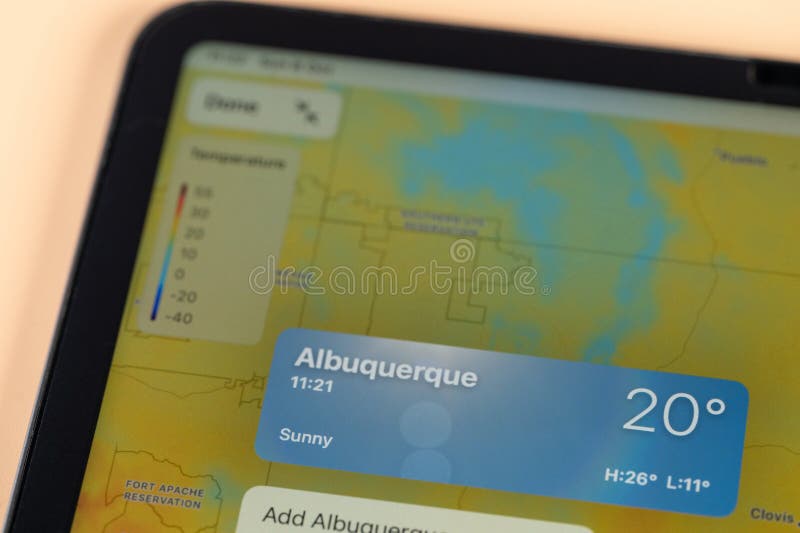Current Temperature In Albuquerque: A Comprehensive Guide
Understanding the current temperature in Albuquerque is essential for anyone planning a visit or living in the area. The city's climate, characterized by its semi-arid and high desert environment, offers unique weather patterns that can influence daily life and activities. Whether you're a resident or a traveler, staying updated on the weather conditions is crucial for making informed decisions.
Albuquerque's weather is a fascinating study of extremes, with hot summers and cold winters, making it an intriguing destination for climate enthusiasts. The city experiences four distinct seasons, each offering its own charm and challenges. From the vibrant spring blooms to the crisp autumn air, the weather in Albuquerque plays a significant role in shaping the local lifestyle.
This article delves into the intricacies of Albuquerque's climate, providing valuable insights into the current temperature trends, historical data, and forecasts. By exploring various aspects of the city's weather, we aim to equip you with the knowledge needed to navigate Albuquerque's ever-changing climate.
Read also:Laura Ingrahams First Husband A Comprehensive Look Into Her Personal Life
Table of Contents
- Climate Overview in Albuquerque
- Understanding the Current Temperature
- Seasonal Variation and Temperature Trends
- Analyzing Historical Weather Data
- Weather Forecasting Techniques
- Tools for Checking Current Temperature
- Extreme Weather Events in Albuquerque
- Impact of Temperature on Daily Life
- Tourism and Weather in Albuquerque
- Conclusion and Final Thoughts
Climate Overview in Albuquerque
Albuquerque, located in the central part of New Mexico, boasts a semi-arid climate with distinct seasonal variations. The city's elevation, averaging around 5,312 feet (1,619 meters), contributes significantly to its weather patterns. Summers are typically hot and dry, while winters can be cold and occasionally snowy. Spring and autumn offer milder temperatures, making them ideal times for outdoor activities.
Key Features of Albuquerque's Climate
Some of the key features of Albuquerque's climate include:
- Hot summers with temperatures often exceeding 90°F (32°C).
- Cold winters with occasional snowfall and temperatures dropping below freezing.
- Low humidity levels throughout the year.
- Precipitation concentrated during the monsoon season, typically July through September.
Understanding the Current Temperature
Knowing the current temperature in Albuquerque is vital for planning your day, whether you're heading outdoors or simply adjusting your indoor environment. The city's temperature can fluctuate significantly throughout the day, especially during the summer months. Morning temperatures may be cool, but by mid-afternoon, they can rise dramatically.
Factors Influencing Current Temperature
Several factors contribute to the current temperature in Albuquerque:
- Elevation: The city's high altitude affects temperature regulation.
- Geography: Being surrounded by mountains influences weather patterns.
- Seasonal changes: Each season brings unique temperature variations.
Seasonal Variation and Temperature Trends
Albuquerque's seasonal variation is one of the most notable aspects of its climate. Spring brings mild temperatures and blooming vegetation, while summer heats up the city significantly. Autumn offers a respite with cooler temperatures, and winter brings the possibility of snow and frost.
Seasonal Temperature Breakdown
- Spring: Temperatures range from 50°F to 75°F (10°C to 24°C).
- Summer: Highs often reach 90°F to 100°F (32°C to 38°C).
- Autumn: Temperatures drop to 40°F to 70°F (4°C to 21°C).
- Winter: Lows can dip below 20°F (-6°C), with occasional snowfall.
Analyzing Historical Weather Data
Historical weather data provides valuable insights into Albuquerque's climate patterns. Records show that the city experiences an average of 280 sunny days per year, making it one of the sunniest cities in the United States. Precipitation is relatively low, with an annual average of around 9 inches (23 cm).
Read also:Amariyah Morales The Rising Star In The Music Industry
Sources of Historical Weather Data
Reliable sources for historical weather data include:
- National Weather Service
- Weather Underground
- NOAA (National Oceanic and Atmospheric Administration)
Weather Forecasting Techniques
Weather forecasting in Albuquerque relies on advanced technology and data analysis. Meteorologists use satellite imagery, radar systems, and computer models to predict temperature changes and weather patterns. These tools help provide accurate forecasts, enabling residents and visitors to prepare accordingly.
Modern Forecasting Tools
- Doppler radar for tracking storms and precipitation.
- Satellite imagery for monitoring large-scale weather systems.
- Computer models for simulating weather conditions.
Tools for Checking Current Temperature
Several tools and apps are available for checking the current temperature in Albuquerque. These platforms offer real-time updates and detailed weather information, ensuring you stay informed about the latest conditions.
Popular Weather Apps
- The Weather Channel App
- AccuWeather
- Weather.com
Extreme Weather Events in Albuquerque
While Albuquerque's climate is generally mild, the city does experience extreme weather events from time to time. Heatwaves during the summer months and occasional winter storms can pose challenges for residents. Understanding these extremes is crucial for safety and preparedness.
Preparing for Extreme Weather
To prepare for extreme weather events, consider the following tips:
- Stay hydrated during heatwaves.
- Stock up on essential supplies during storm warnings.
- Monitor local weather updates regularly.
Impact of Temperature on Daily Life
The current temperature in Albuquerque significantly impacts daily life, influencing everything from clothing choices to outdoor activities. Residents and visitors must adapt to the city's unique climate to ensure comfort and safety.
Adapting to Albuquerque's Climate
- Dress in layers to accommodate temperature fluctuations.
- Use sunscreen and protective gear during sunny days.
- Plan outdoor activities during cooler parts of the day.
Tourism and Weather in Albuquerque
Weather plays a crucial role in Albuquerque's tourism industry. The city attracts visitors year-round, with each season offering its own attractions. From hot air balloon festivals in the fall to skiing in the Sandia Mountains during winter, the weather enhances the tourist experience.
Seasonal Tourist Activities
- Spring: Enjoy hiking and exploring local parks.
- Summer: Visit outdoor markets and cultural events.
- Autumn: Attend the Albuquerque International Balloon Fiesta.
- Winter: Experience skiing and snowboarding at nearby resorts.
Conclusion and Final Thoughts
In conclusion, understanding the current temperature in Albuquerque is essential for both residents and visitors. The city's unique climate, characterized by its semi-arid conditions and distinct seasonal variations, offers a fascinating study of weather patterns. By staying informed about temperature trends and weather forecasts, you can make the most of your time in Albuquerque.
We encourage you to share your thoughts and experiences in the comments below. Additionally, explore our other articles for more insights into Albuquerque's culture, lifestyle, and attractions. Stay connected and keep checking back for the latest updates on weather and beyond!


